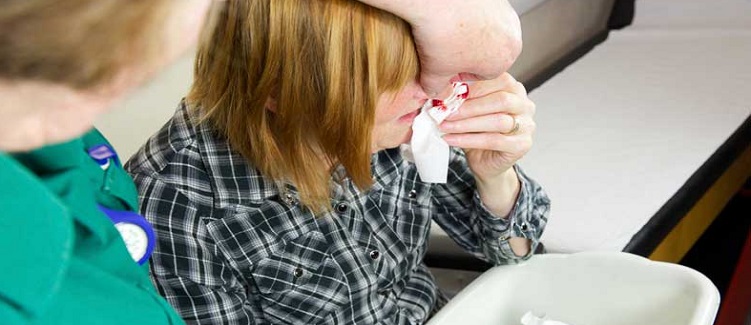If you or your child gets nosebleeds every winter, you may wonder if it’s normal. Yes, it could be. The nose contains many small blood vessels that get irritated and bleed easily, especially in dry air.
Thankfully, most nosebleeds aren’t serious. Read on for details about what causes nosebleeds, how to treat them, and how to prevent them in the first place.
What Is a Nosebleed?
Nosebleeds (medical name: epistaxis) happen when small blood vessels in the nose break. It’s a common occurrence. In the U.S., about 60% of all people will have a nosebleed at some point in their lives.
Some people are more prone to nosebleeds. They happen most frequently in children aged two to 10, and adults aged 50 to 80.
A nosebleed can last from a few seconds to 15 minutes or more.
Never Miss a Beat!
Subscribe to Our HealthBeat Newsletter!
Thank you for subscribing!
You can now select the specific newsletters you'd like to receive.
You are already subscribed.
Subscribe to more newsletters in our email preference center.
Sorry, an error occurred. Please try again later.
Get Healthy Tips Sent to Your Phone!
Types of Nosebleeds
There are two types of nosebleeds.
Anterior nosebleeds
Anterior nosebleeds are the more common — and less serious — type of nosebleed.
They happen when the bleeding is in the front of the nose. Anterior nosebleeds usually start on the nasal septum, the wall of cartilage that separates the nostrils.
Posterior nosebleeds
Posterior nosebleeds begin high and deep within the nose, making it hard to determine the source of the bleeding. The blood may flow down the throat and can make your sputum blood tinged.
Posterior nosebleeds are more likely to happen in older people. They may also occur in people with a previous nasal or sinus injury or surgery.
What Triggers a Nosebleed?
Nosebleeds happen when something irritates the moist inner lining of the nose. They are more likely to occur in dry, indoor heat, when the nasal passages can get dehydrated.
Nosebleeds can also occur when something causes trauma to a blood vessel in the nose. These blood vessels are delicate and can get damaged easily.
Common causes of nosebleeds
- Picking your nose.
- Blowing your nose too hard, or for a long period of time.
- Hot, dry air.
- Allergies.
- Colds.
- High altitude.
- Chemical irritants.
- Smoking.
Less common causes of nosebleeds
- Nasal infections.
- Foreign objects lodged in the nose.
- Problems with bleeding from clotting disorders like hemophilia.
- Medications that prevent blood clotting (like warfarin or aspirin).
- Fractures of the nose.
- Snorting drugs like cocaine.
- Oxygen therapy through a nasal cannula (a device that delivers supplemental oxygen through the nose).
- Tumors of the nose (more common in smokers).
- Increased risk of bleeding with hypertension, alcohol use and heart failure due to fragile blood vessels.
How to Stop a Nosebleed
It’s likely the advice you’ve heard about stopping a nosebleed is wrong. You shouldn’t tilt your head back or lie down. That could cause the blood to run down your throat and upset your stomach.
Here’s what to do instead:
- Try to keep your head higher than your heart. Sit up and lean forward slightly, so the blood doesn’t run down the back of your throat.
- Breathe through your mouth.
- Try to stay calm (or help a child with a nosebleed stay calm). Although the sight of blood can be alarming, most nosebleeds are harmless.
- Gently blow your nose to clear clots.
- Pinch the soft parts of the nose with your thumb and index finger.
- Hold your thumb and finger in place for five minutes.
- If your nose is still bleeding, try another 10 minutes of gentle pinching.
Sometimes nosebleeds start up again soon after they’ve stopped. To keep that from happening:
- Don’t blow your nose or sniff right after it stops bleeding.
- Don’t strain, bend down, or lift anything heavy right after a nosebleed.
- Avoid lying down, sit and lean forward. Keep your head higher than your heart once your nose stops bleeding.
- Apply cold compresses or ice across the bridge of your nose. The cold helps constrict blood vessels in your nose.
- Spray the nose with an over-the-counter nasal decongestant. Look for one with oxymetazoline in the active ingredients. The spray will help constrict the blood vessels in your nose.
How to Prevent Nosebleeds
If you or your child are prone to nosebleeds, take the following steps to help prevent them. These precautions are especially important in dry winter heat.
- With a cotton swab, apply a light layer of petroleum jelly to the inside of your nose a few times a day. Pay special attention to the septum, where most nosebleeds start.
- Run a cool mist humidifier in the bedroom at night.
- Keep your home as cool as you can in the winter.
- If you smoke, try to stop or cut back.
- Discourage children from picking their noses.
- Keep kids’ fingernails short to avoid scratching the nose.
- Consider using a saline nasal wash to keep your nose moist in the winter months.
When You Should See a Doctor for a Nosebleed
Nosebleeds are usually annoying but harmless. But there are times when they require medical attention.
You should call the doctor if:
- Your nose has been bleeding more than 20 minutes or so, despite at-home treatment.
- You think you broke your nose.
- You have a nosebleed after a head injury, such as in a car crash. Your doctor will want to find out where the bleeding is coming from. A nosebleed after an injury could indicate a skull fracture.
- You or your child has frequent nosebleeds.
- You have nosebleeds and you’re taking blood thinners.
- Your nosebleed happens after sinus or other surgery.
Treatment for more serious nosebleeds may include:
- Cautery — doctors burn the blood vessel with an electric current or a laser to stop the blood flow.
- Nasal packing — doctors pack the nose with a special gauze, sponge, or inflatable balloon to stop bleeding. They will remove the packing material after a few days.
- Reducing the amount of blood thinner or aspirin you take.
- Treating blood clotting problems.
- Removing a foreign object from your nose.
- Treating a broken nose.
If frequent nosebleeds are a continuing problem, you should see an ear, nose, and throat specialist (ENT) as soon as possible.
Editor's Note: This article was originally published on , and was last reviewed on .
About UPMC
Headquartered in Pittsburgh, UPMC is a world-renowned health care provider and insurer. We operate 40 hospitals and 800 doctors’ offices and outpatient centers, with locations throughout Pennsylvania, Maryland, New York, West Virginia, and internationally. We employ 4,900 physicians, and we are leaders in clinical care, groundbreaking research, and treatment breakthroughs. U.S. News & World Report consistently ranks UPMC Presbyterian Shadyside as one of the nation’s best hospitals in many specialties and ranks UPMC Children’s Hospital of Pittsburgh on its Honor Roll of America’s Best Children’s Hospitals. We are dedicated to providing Life Changing Medicine to our communities.

